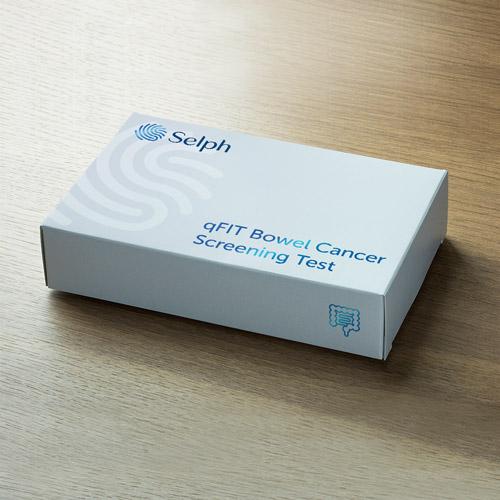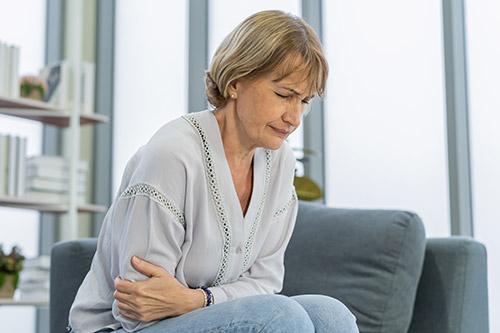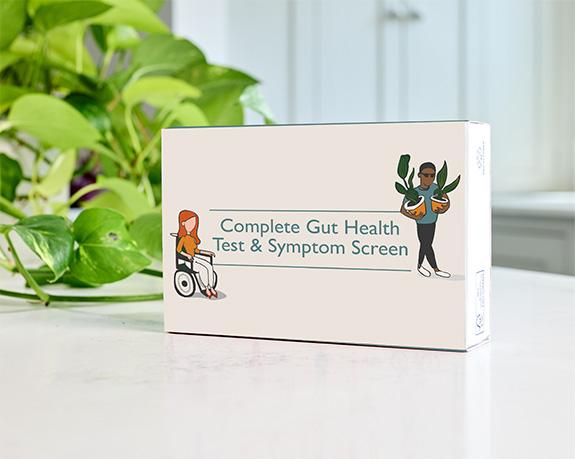The five main bowel cancer symptoms you need to know and what to do about them
Last updated
The five bowel cancer symptoms you need to know
- A change in bowel habit
- Blood in your stool
- Stomach pain
- Weight loss
- Tenesmus (a sensation of needing to open your bowels even though you’ve only just been)
If you experience one or more of these symptoms and they’re not settling down then get a qFIT test and book an appointment with your GP.
As with most types of cancer, the earlier you pick up bowel cancer the better your chances of beating it. In the UK, about 90% of bowel cancers are diagnosed because the person has symptoms1. So knowing the main bowel cancer symptoms to watch out for is crucial so you can get tested and bring them to the attention of your GP as quickly as possible.
But before we dive into the 5 key bowel cancer symptoms you need to know, it’s important to understand that it’s even better to pick up bowel cancer before you get any symptoms.
Don’t wait until you get symptoms to get checked for bowel cancer
A sobering fact: you’re about 3 times more likely to survive bowel cancer if you’re diagnosed through screening compared to being diagnosed because you’ve got bowel cancer symptoms2. By the time a bowel cancer is actually causing symptoms, it’s had to grow to a certain size and you’ll have already had it for years. The trouble is, as they grow, bowel cancers are more likely to spread through the bowel wall, into nearby glands and then to other organs.
You’re about 3 times more likely to survive bowel cancer if you’re diagnosed through screening compared to being diagnosed because you’ve got bowel cancer symptoms.
This is why over half of people being diagnosed with bowel cancer are already at stage 3 or 4 where the cancer has started to spread and it’s much harder to cure3. For many people, waiting until they have symptoms from a bowel cancer is simply too late.
The rates of bowel cancer are rising in the under 50s and I strongly recommend that you do not wait until you’re invited to the bowel cancer screening programme in your mid-50s before you start screening for bowel cancer with a simple qFIT test. Follow the lead of countries like the USA and Japan where they start bowel cancer screening in their 40s and have much better bowel cancer survival than we do in the UK. Check out our article on when to start screening for bowel cancer for more info.
Your age matters
Before we go through the five main bowel cancer symptoms it’s important to talk a little about context. Some 90% of bowel cancers are diagnosed in people over 50. Of the people getting bowel cancer before the age of 50, the vast majority are in their 40s. It's extremely rare to get bowel cancer in your 20s or 30s. In fact, the chance of being diagnosed with bowel cancer under 40 is about 1 in 5,000 (23 cases per 100,000 of the population)4.
Why is this important? Well, many bowel cancer symptoms are pretty common and most of the time, they’re not caused by bowel cancer but by some other condition. So if you have one or more of these symptoms and you’re under 40, it’s very very unlikely that they’re caused by bowel cancer. Even if you’re in your 40s, it’s still unlikely to be bowel cancer. This is not to say that, just because you’re under 50, you shouldn’t take these symptoms seriously and get them checked out - you should. But just be aware that actually it’s unlikely that bowel cancer is the cause so try not to get too anxious.
The five main bowel cancer symptoms
Bowel cancer can cause quite a few different symptoms but we’ll concentrate on the five main bowel cancer symptoms to be aware of. Remember though, many conditions can cause these symptoms and most of the time it’s not bowel cancer.
The 5 main bowel cancer symptoms
- Change in bowel habit
- Blood in your stool
- Stomach pain
- Unintentional weight loss
- Feeling like you need to open your bowels even though you've only just been
Change in bowel habit
When it comes to bowel habit, there’s no “normal”, there’s only “normal for you”. You might open your bowel 3 times a day or you might open your bowel 3 times a week (or less!). This is all normal. You might pass small pebbles or loose mush. Again, this is all normal. What matters is knowing what’s normal for you in terms of frequency (how often you go) and stool consistency and then noting if this changes.
When it comes to bowel habit, there’s no “normal”, there’s only “normal for you”.
For example, if you’re a regular-as-clockwork once-a-day person and you notice that your stools have become looser and you’re going two or three times a day, this is a “change in bowel habit” and you need to take notice. Now, we all get some changes from time-to-time. Stress, travel, food, bugs - they can all have an effect. But these effects don’t usually last for long. So if you have a change in bowel habit and it’s been going on for 2 or 3 weeks, particularly if there’s no obvious cause, then you should get this checked out with your doctor.
Most often bowel cancer causes looser, more frequent stools but it can also push people towards constipation so take both seriously if they’re different from your normal. Seeing mucus (looks a bit like snot) in your stool also counts as a “change”. Roughly half of people presenting to their doctor with bowel cancer had a change in bowel habit5.
Blood in your stool
“Rectal bleeding” means seeing blood in / on your stool or on the paper after wiping. Bleeding from the bottom is actually really common and most of the time it’s not bowel cancer.
Conditions like piles (haemorrhoids) or a fissure-in-ano (a small, painful tear in the anus) are by far the commonest cause of bleeding from the bottom and most of us have experienced these at some point. Both of these tend to cause bright red, fresh bleeding, often just on the paper but sometimes in the bowl too. The blood might coat the stool but isn’t usually mixed in with it. Fissures tend to be pretty sore but haemorrhoids are typically painless. Both are associated with constipation or hard stools.
Bleeding from a bowel cancer is often darker red, painless and mixed in with the stool. About 60% of people with symptoms from bowel cancer experience rectal bleeding5. If you’ve got bleeding from the bottom, you’re not 100% confident of the cause and it’s not settling down on its own, you should get it checked out.
Stomach pain
We all experience stomach pain from time-to-time. But if you have stomach pain that doesn’t go away after a week or so then it’s worth speaking to your doctor about it. The vast majority of the time stomach pain is not caused by bowel cancer. It might be irritable bowel syndrome or it might be a problem like gallstones or gastritis. But these are still worth finding out about.
Half of patients presenting with bowel cancer symptoms had stomach pain5.
Unintentional weight loss
Let’s face it, losing weight is not easy. If you start losing weight without trying, there’s often something going on that you need to get checked out. Sometimes you might not even notice this yourself if you don’t weigh yourself frequently. So, if friends or family members start commenting about how you’ve lost weight or if you notice that your clothes are a bit baggy or you’re doing up your belt an extra notch, take notice and see your doctor. Of all the symptoms of bowel cancer, this is the subtlest and goes the longest without being picked up.
40% of patients presenting with bowel cancer symptoms complain of weight loss5.
Tenesmus
“Tenes-what” you might say. Tenesmus is the fancy word for feeling like you need to open your bowels even though you’ve only just been. A constant feeling like “there’s something there”. Tenesmus affects about 5% of people presenting with bowel cancer symptoms and is another reason to see your doctor5.
What should you do if you have bowel cancer symptoms?
If you have one or more of these bowel cancer symptoms that aren’t settling down then you should do two things. Firstly, get a qFIT bowel cancer test which checks for blood in the stool. Even if you have rectal bleeding, you should still get a qFIT test. Secondly, make an appointment with your GP for assessment.
The reason to get yourself a qFIT test as quickly as possible is that the current NICE guidelines (which govern how GPs work) ask GPs to get a qFIT test done on anyone they suspect of having bowel cancer before referring them for a specialist opinion6. In general, GPs will only refer for a specialist opinion if the qFIT test is positive (over 10µg/g).
So, depending on how long it takes you to get a GP appointment and then to get your qFIT test result back, you might be waiting weeks for a referral. Alternatively, you can do a qFIT test with us, have your result back in a day and bring it with you to your GP appointment, significantly speeding up the whole process. Also, if your qFIT result is negative, you get piece of mind straight away because the chance of having bowel cancer with a negative qFIT test is about 1-in-10007.
Get tips on better health
Sign up to our emails on the better way to better health.
We'll keep you up-to-date with the latest research, expert articles and new ways to get more years of better health.






